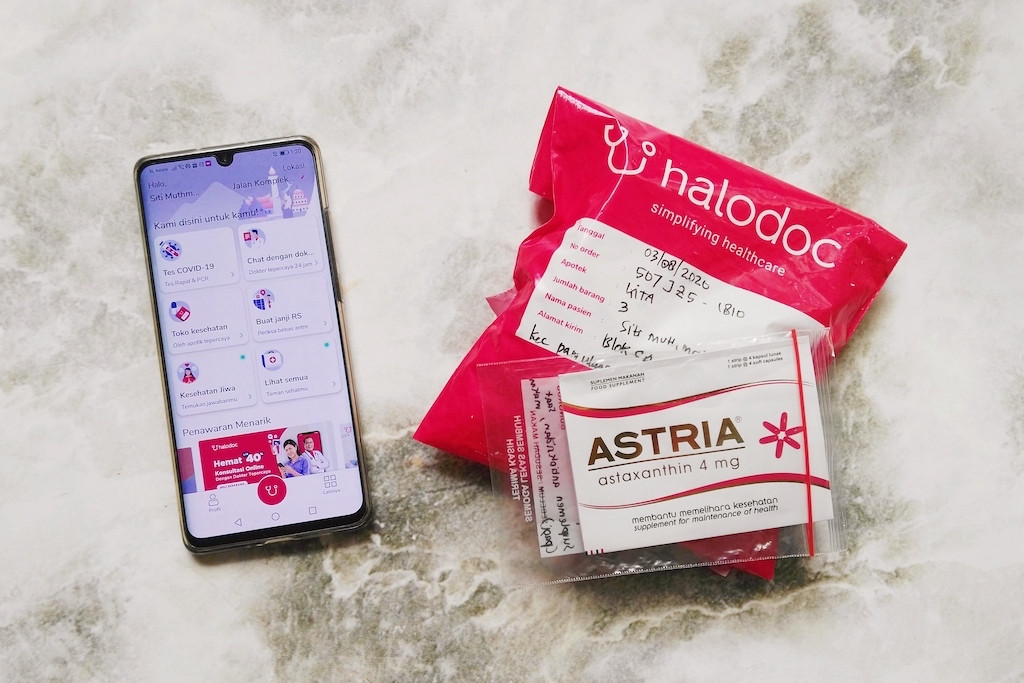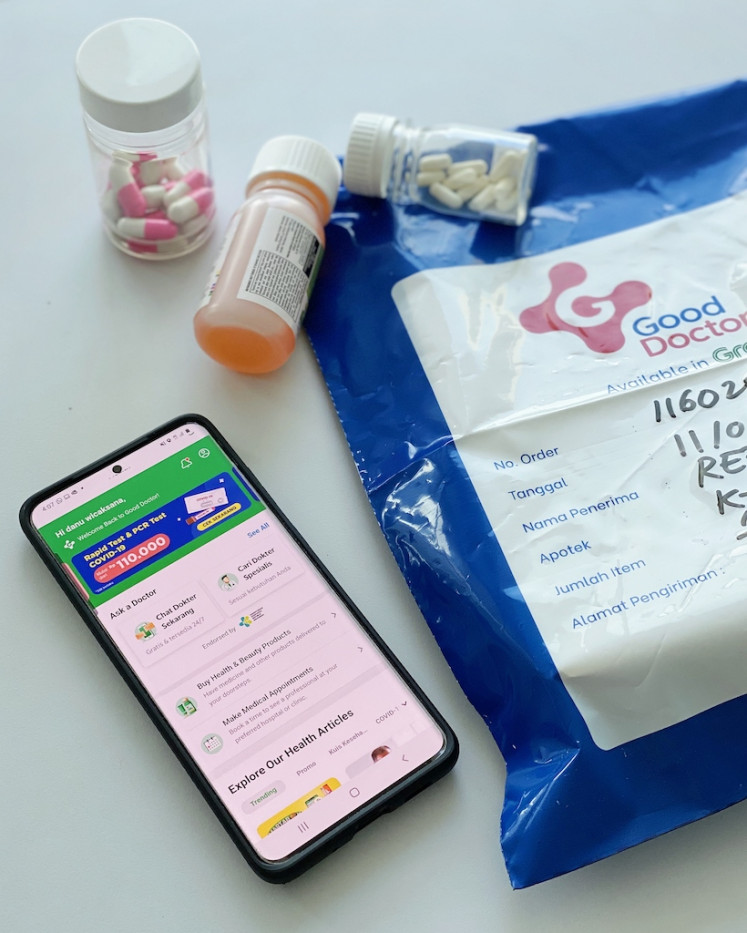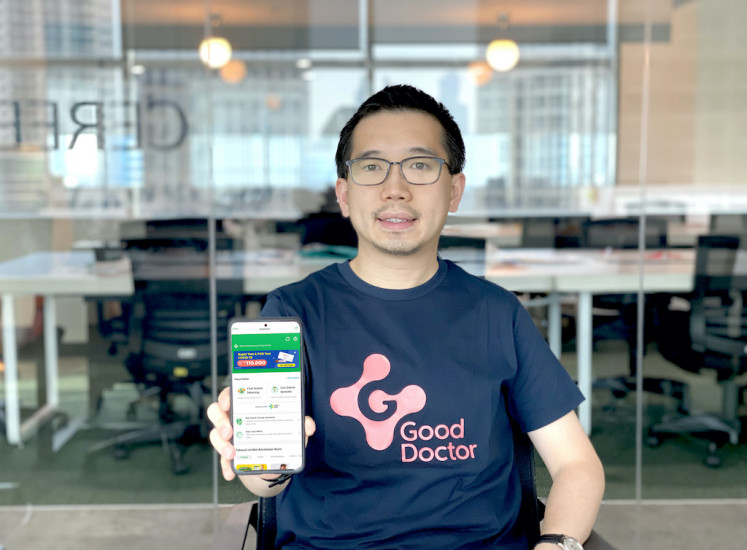Popular Reads
Top Results
Can't find what you're looking for?
View all search resultsPopular Reads
Top Results
Can't find what you're looking for?
View all search resultsTelemedicine offers affordable, accessible health care during COVID-19
For people in need of medical assistance or advice, going to a hospital amid the increasing cases of coronavirus infection can be terrifying, considering the risk of exposure or worse, contracting, the disease. In many cases, however, medical consultation is urgently needed and cannot be postponed any longer.
Change text size
Gift Premium Articles
to Anyone
The ongoing global health crisis had caused disruptions to many aspects of life, including accessing healthcare services.
For people in need of medical assistance or advice, going to a hospital amid the increasing cases of coronavirus infection can be terrifying, considering the risk of exposure or worse, contracting, the disease. In many cases, however, medical consultation is urgently needed and cannot be postponed any longer.
This is where telemedicine comes in to play a significant role, meeting people’s healthcare needs without their having to leave home. Telemedicine, which involves using technology to provide medical consultations remotely, requires only an internet connection and a smartphone or other mobile internet device to consult with a licensed physician.
The Jakarta Post recently tried out the Halodoc healthcare platform, which supports medical consultations, drug purchases and delivery, and other health services.
After downloading and installing the Halodoc app, which is available for both Android and iOS, users can choose the “Chat dengan dokter” (Chat with a doctor) if they are seeking a medical consultation. An “instant chat” will open with a couple of doctors to choose from. If the user wants more options or wants to chat with a specialist, they can choose from the “Dokter Umum” (general practitioners; GPs) facility or doctors with a variety of medical specializations, from obstetricians to gynecologists and to dermatologists, even psychiatrists.
The Post’s first consultation was free on Halodoc, which appears to apply to every first-time user. Afterward, a GP consultation costs from Rp 10,000 (67 US cents) to Rp 25,000, while a specialist consultation can cost between Rp 30,000 and Rp 50,000.
A user can also view the doctor’s profile photo and background, including their education and where they currently work. Each doctor also has a likeability rating on a scale from 81 to 100 percent.
The Post’s first consultation was with a male GP who currently works in Morotai Island regency, North Maluku. According to Halodoc, the doctor has 15 years of experience and a 100 percent likeability rating. Each consultation is 30 minutes long using a built-in live chat feature, and this was enough time to discuss symptoms and obtain a preliminary diagnosis.
Within that 30-minute time frame, the GP also managed to write up his diagnosis, notes and a prescription. Furthermore, all the medicines he prescribed – which totaled Rp 142,500 – could be ordered right away from Halodoc’s partnering pharmacy. User can also opt to order some of the medicines or not order anything at all.
Payment for the consultation and any prescribed medicines can be made using GoPay or a credit or debit card, while Gojek provides the delivery service for prescription drugs.
On completing the transaction, the Halodoc app sends the prescription to the partnering pharmacy located closest to the user’s delivery assess and places a pickup and delivery order with Gojek. This means that a user can receive their medicines within an hour or so after their 30-minute consultation.
The convenience telemedicine offers has inevitably led to a surge in the use of the digital healthcare technology.
Danu Wicaksana, managing director of Good Doctor Technology Indonesia, said in a statement that telemedicine had gained significant traction in the health industry, especially amid the COVID-19 physical distancing policy.
“The public began to realize the true value of technology in the healthcare sector,” said Danu. He added that the increased use of telemedicine had prompted Indonesian healthcare authorities, led by the Health Ministry, to restrict face-to-face health services during the epidemic.
Good Doctor is a relative newcomer to Indonesia’s telemedicine industry and partners with ride-hailing company Grab, but Danu said that it had already seen user traffic for consultations increase eightfold since the coronavirus emerged in Indonesia. Of this, 25 percent of all consultation requests were related to COVID-19.
“A similar trend was also seen in the recent McKinsey survey on more than 700 Indonesian customers, with telemedicine showing 67 percent usage growth in the past six months,” he said.
He also noted that around 66 percent of telemedicine users surveyed said that they would continue to use the digital service even after the health crisis ended.
Regardless of the increasing trend in telemedicine usage, Danu said that Indonesia’s healthcare system still needed much improvement, pointing out that digital health technology in the country had been a little slow to develop compared to some of its ASEAN neighbors.
Although the Health Ministry had positioned the telemedicine industry among the government’s “8 Key Areas and Strategies to Reform the National Healthcare System”, Danu stressed that much work remained to be done.
“Cross-coordination and collaboration are needed because currently, the [existing] regulations that stipulate collaboration within the [healthcare] ecosystem are still in the preliminary stage,” he said.
Danu added that stakeholders needed to develop a seamless online-offline hybrid system, which he called “hospital without walls”. He stressed that this was necessary because many diagnoses would need further treatment at brick-and-mortar medical facilities like hospitals and clinics.
The power or telemedicine: Managing director of Good Doctor Technology Indonesia, Danu Wicaksana, says that through telemedicine, people can expect to continue consulting medical professionals virtually and obtain the necessary and proper medication. Meanwhile, medical professionals can adopt new ways of working using technological innovations. (Good Doctor/File)He also pointed out that when the government called for accelerated rapid diagnostic testing and polymerase chain reaction (PCR) testing for COVID-19, users turned to Good Doctor for preliminary consultations on their COVID-19 risk level, as well as to register with testing programs. According to Danu, this helped to reduce the burden on hospitals and provided easy access to the tests.
“Telemedicine companies like Good Doctor will not replace the role of formal medical institutions, but will instead [fill] the gaps in the healthcare system,” he said.
It seems that digital health technology could offer a solution to the issues of cost, access and quality that have long hung over Indonesia’s healthcare system.












